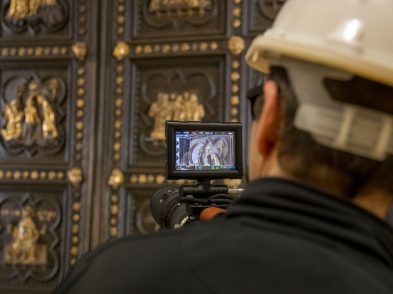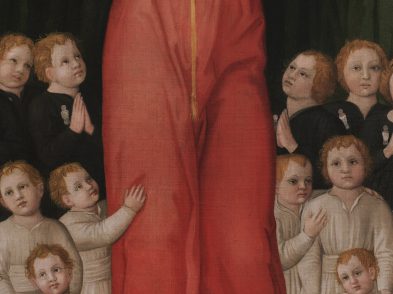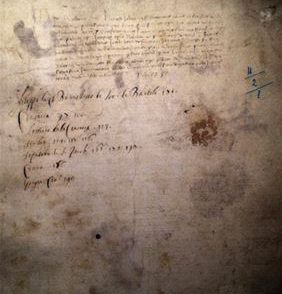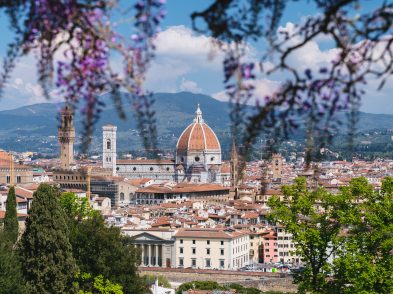Filmmaker David Battistella moved to Florence from Canada in 2011 to pursue his dream: writing and producing a feature film based on Ross King’s 2000 book Brunelleschi’s Dome, about the life of Filippo Brunelleschi and the building of Florence’s Cupola. This column, which began with TF 149, chronicles Battistella’s pursuit of his dream, including anecdotes of his new life in Florence and his efforts to finance and launch his ambitious project.

The process of being a history detective and trying to piece together the life of Filippo Brunelleschi has been a fascinating journey that has affected me on many levels. I have always appreciated things that are handmade, and this is why my Vimeo page profile states, ‘Handmade personal films.’ My film about Brunelleschi falls into this same category.
I also get a great feeling by doing some of the research for the film by hand. Many of the notes I take are hand-written on paper. I like to sketch and record images on tracing paper by hand. It may seem laborious, but there is something about the tactile experience of doing things by hand that opens a different connection to things. I like to think it’s what Albert Einstein referred to as ‘the ether.’ Somehow, this tactile connection opens up something in you that allows you to connect with things you might easily pass over or ignore.
I have met many artisans in Florence since I first arrived. I use the term ‘artisan’ in the broadest sense. You might not hear the term ‘artisan filmmaker,’ but one can certainly have the approach of an artisan when making whatever it is he or she makes. The same holds true for my friends Paolo, a goldsmith, and photographer George Tatge (see TF 169). My priest is even an artisan in the sense that he takes great care with his words and his spiritual approach to the Gospel.

As I see it, we are all artists, and the thing that seems to run through the mindset of all artisans is a noble cause. My noble cause is bringing the story of a true genius to life in a respectful way, while trying to honor history accurately (this is not entirely possible in my case, as I have to imagine so much of Brunelleschi’s life). Another Florentine artist I met recently honors something beautiful through his work: the written word and the right to free speech.
I met Lorenzo Perrone at a dinner and we struck up a conversation about art; that’s when he shared his wonderful work with me. From his modest studio near Palazzo Pitti, in the Oltrarno, Perrone is producing some of the most profound, dynamic and modern works I have thus seen in Florence.
His work, which is centered on repurposing donated books in white glue, gesso and other materials, comes to symbolize the profound stories of our time. He has elevated the power of the book to a new level, reminding us at once that free speech and the power and technology given to human beings via the distribution of the written word through literature are still threatened by ignorance.
By retelling the stories of oppression of our times and repurposing used books as sculpture, Perrone’s libri bianchi come to symbolize the very essence and pureness of the written word. His white books represent all that is good about the technology of the alphabet and literacy, and serve as a reminder of the empowering wisdom of the written word.
By recreating scenes such as Tiananmen Square, reinterpreting the song of the Jews and the Diary of Anne Frank as barbed wire books, Perrone reminds us how precious and tenuous our world can become and how fragile the human voice, through the written word, can be. We live in times of great irony, yet Perrone’s libri bianchi serve as a reminder of the human rights we hold so dear and for which so much blood has been shed.

Each piece is made by hand, over a period of weeks or months, to form the perfect story retold by the artist. Perrone will showcase a selection of his works at an upcoming collective show, Mimesis: Variazioni sul libro, at the Library of the Uffizi, from May 9 to June 9.
It is my sincere hope that these works be displayed in galleries and libraries across the world, to help serve as a reminder to those who enter the places where we seek knowledge. We must continue to believe (and be reminded) that reading and literacy are basic human rights to be shared by all and are the essential technologies that drive our connectedness.
For those of you who will not have the chance to see the exhibit, you can meet Perrone and his libri bianchi in Bottega Battistella’s next film.








